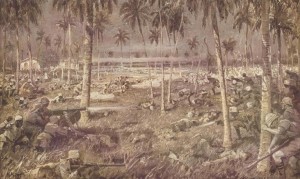
There is no doubt that World War I was an important event in World history. I contend that it was, in fact, the most critical event of the Twentieth Century. The First World War laid the stage for the rest of the century and prefaced every other major development in World history since 1914. The last one hundred years of history have been dominated by the legacy of the Great War. The age of empires and colossal colonial powers was all but put six feet under at the Treaty of Versailles in 1919 and even before then, during the war itself. True, the British and French empires survived the war but the First World War had erased the old world order and had ushered in the modern age, an age that was bereft of the colonial powers of the Napoleonic age before it. While the French and British maintained power overseas, the process of Decolonization started in World War I.
The Western justifications for imperialism, already hanging by a thread, would be rendered useless as a result of the First World War. One of the most overlooked battles of the conflict, a minor engagement in the far-flung corner of the world, would alter the course of West-East relations for the next half-century, leading to Decolonization and the end of empires which had been in existence since the Seventeenth Century. This battle was the fighting at Tanga, East Africa in 1914. What Tanga proved was the principle that all men are created equal and it disproved the notion held by Europeans that their civilization was not only superior technologically and industrially (which it was) but was, in fact, superior socially, morally and biologically (which was not always the case). This illusion of Western superiority and Eastern inferiority was planted and dutifully watered and nourished by Social Darwinism and the philosophizing of Charles Darwin and Herbert Spencer. However, it was pulled out like the weed it was at Tanga.
In the Battle of Tanga, African soldiers in the German army, under the command of Paul von Lettow-Vorbeck, mauled British and Indian forces in German East Africa (now Tanzania). This engagement was decisive not only because it enabled von Lettow-Vorbeck to continue fighting the British in East Africa (he was the last German officer to surrender his forces in the entire war) but more importantly, it put to death the notion that in a fight between a generic Westerner and a generic Easterner, both armed with the same equipment and training, the Westerner, due to his individual superiority, would always win. Other battles like the naval engagement at Tsushima (a Japanese victory over Russia in 1905) and Adowa (an Ethiopian victory over Italy in 1895) had already demonstrated this but Tanga confirmed it.
The early days of November 1914, the time at which the Battle of Tanga was fought, was a rough time to be a white supremacist. The long-held principle of Western superiority was challenged and broken at Tanga. It was not until after World War II that Decolonization began in earnest but the seeds of racial equality (not in practice but in theory) had been sown at Tanga and the world would reap the consequences. World War I is remembered as a war fought in the trenches of France and Belgium but one of the most decisive battles of the war was fought in the swamps of East Africa.
Note: This post is part of a series of blogpost on the First World War, leading up to the release of “World War I: The Unraveling of the World” by Jace Bower in the Fall of 2014. To see other posts in this series, type “Unraveling” in the search bar located in the top right corner of this page.
